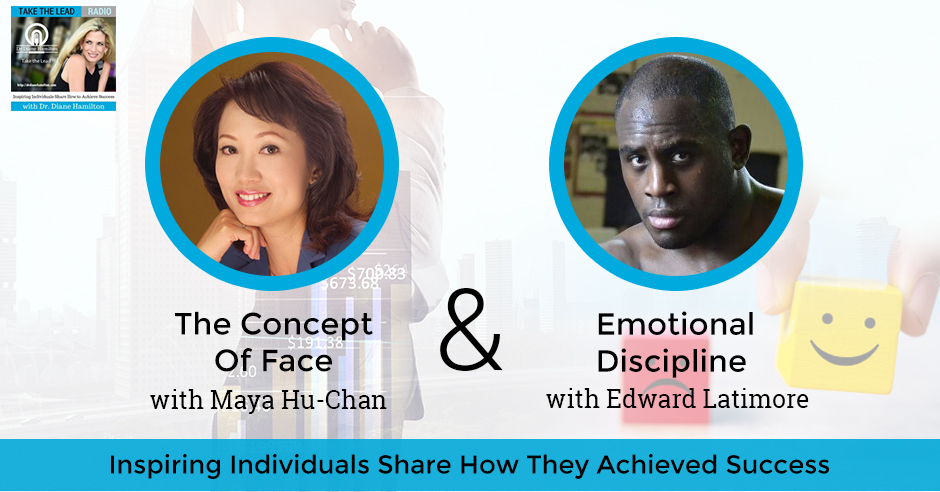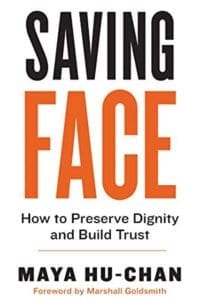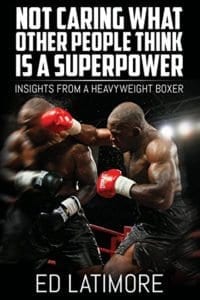Emotional intelligence is vital to understanding other people as well as yourself. It comprises values such as self-esteem, pride, dignity, and the concept of face. Listen in as Maya Hu-Chan discusses the concept of face and how it permeates all levels of social and business interactions. Maya is a globally-recognized keynote speaker and certified coach who concentrates on leadership and business. Learn more as she talks with Dr. Diane Hamilton about the importance of self-worth, identity, and how these affect individuals.
Life experiences teach us the majority of what we know as people. These experiences mold us into the people we have become today. Edward Latimore is a best-selling author who focuses on self-improvement and has had many life experiences himself. In this episode, he talks with Dr. Diane Hamilton about emotional discipline and how it helps us make decisions and reach conclusions. Join Edward as he explains how emotional arguments and social pressure plays a role in everyone’s lives.

I’m glad you joined us because we have Maya Hu-Chan and Edward Latimore here. Maya is ranked top eight Global Solutions Thinkers by Thinkers50, World Top 30 Leadership Guru, and she has a new book. Edward Latimore is a bestselling author, former professional heavyweight boxer, and author of several books. We’re going to talk some interesting things about what it takes to be successful in business and in life.
Watch the episode here:
Listen to the podcast here
The Concept Of Face With Maya Hu-Chan
I am here with Maya Hu-Chan, who is a globally recognized keynote speaker, author leadership educator, and ICF Master Certified coach. She’s ranked Top Eight Global Solutions Thinkers by Thinkers50, World Top 30 Leadership Guru, Top 100 Thought Leaders in Management and Leadership, and worked with thousands of leaders from global Fortune 500 Companies, government nonprofits around the world. She’s the author of Saving Face: How to Preserve Dignity and Build Trust. It’s nice to have you here, Maya.
Thank you for having me, Diane.
We know many of the same people. I’ve had Marshall on the show and a lot of Thinkers50s on the show. It’s a natural fit and I was excited for you to have your latest book. This is getting a lot of attention and I want people to get a little background on you because you’re a bestselling author and a lot of people are aware of your work, but in case they aren’t, can you tell me what led to your getting to be this international guru?
I’m humbled and honored with those recognitions. Thank you for that wonderful introduction, Diane. I have worked with leaders around the world for decades. Over the years, I have learned much about their challenges, frustrations and also their success stories. I have shared with them a concept that resonates with leaders at all levels. It’s essential for their leadership, but it’s also counterintuitive sometimes and it’s the concept of face. As I work with them as executive coach and also teach leadership classes, this issue often comes up. When you think about the concept of face, it permeates all levels of social and business interactions. It is a universal concept beyond its origins of Asia. It speaks to the common human desire to be accepted and respected. When you hear the term, it’s not about the money, the real issue is often about face.
You were born and raised in Taiwan, but you live in California. When we talk about saving face, what do you mean by face?
I have a definition of the face. Face represents individual’s self-esteem, self-worth, identity, reputation, status, pride and dignity. When we think about the concept of face, it’s about who you are, how you see yourself and also how others perceive you. It’s your whole person inside and out.
How is that different from emotional intelligence in understanding your own emotions and understanding those and others, how you see yourself and others? Does it tie into that?

It’s tying to emotional intelligence. The face has to do with how we relate to others and also how we view ourselves. When we think about face, it’s the social currency in our world. In other words, the more face you have, the easier and faster you can get things done. Imagine that how you build a supply of a face with someone is by continuously making a deposit. We build trust, we express gratitude, appreciation, we compliment people and recognize them for their contribution.
We emphasize, put ourselves in their place to understand their challenges and give them their voice equal time and weight. We’re continuously making that deposit as we cultivate the relationship. We need to make a withdrawal at some point, and we’re careful to not make someone lose face. We provide feedback, for example, in a way that saves face and preserve dignity, and if we mistakenly cause them to lose face, that relationship can still be saved if there are enough deposits in the face account to cover that withdrawal. I like to think face as our social currency. The more you have, the easier and faster you can get it done.
It’s an interesting concept, but as I was saying on the saving face thing, it’s an expression you hear a lot, but I’m curious where it came from. Do you know?
When we talk about saving face in the Western culture, people’s common perception is, “You’ve done something that’s embarrassing. I’m going to do something to help you save face.” It’s a superficial expression in our daily conversation. From the work that I have done and I assume information that I was born and raised in Taiwan and I’ve lived in California for decades. As I work with leaders around the world, I realized that saving face is much deeper than about covering up for some embarrassment, because that’s the exact opposite of what saving face should be.
When we think about face, there are three different key concepts and the first concept is honoring face. The second one is about avoid causing someone to lose face. The third concept is about saving face. I’m happy to go into each one of them. The three different concepts that weave it together is about how we interact with people, how we communicate, how we build long lasting relationship authentically and to make that real connection.
Let’s start with the honoring phase. Honoring phase is to make that deposit of face. Under our face are actions that we take to show respect, admiration, and grant dignity to others. How do you honor face? It’s not rocket science. Many of the times, we’re doing that already. For example, ask people for their input, and you give credit where it’s due. You express your appreciation and empathize with people. You acknowledge their input and also give their voice equal time and weight. You are sending a message to the other person that, “I see you. I hear you. You matter.” One of my favorite quotes is from Maya Angelou. She said, “People will forget what you said, what you did, but people will never forget how you make them feel.”
Honoring face is something that we can do in a daily basis to continue to make that deposit by demonstrating respect, admiration and dignity to others. The second concept of face is that it’s about losing face. That’s something we wanted to avoid. The losing face describes the conditions where people feel devalued, humiliated or unappreciated, and sometimes can be subtle. When people lose face, it provokes shame, fear, guilt, vulnerability, and also a wide range of negative emotions.
[bctt tweet=”The concept of face is about who you are, how you see yourself, and how others perceive you.” via=”no”]Those negative feelings can directly impact how well people do their job, they perform at their work, how much they speak up and share their ideas, and even how long they stay with the company. It has some real hard impact on the bottom line of the business, of the organization. When I was growing up in Taiwan, then I often heard from my teachers and my parents about this old 1,000-year-old saying, “Spilled water is hard to regain.” What that means is imagine that you ask, “Would you give me not a cold glass of water?” and you spill water all over the floor.
How hard is it to get it all back into the glass? It’s hard or nearly impossible. Even if you manage to get some back into the glass, do you still want to drink it? Probably not, because the water is no longer the same. It says about teachers that when we speak or take actions, we need to be mindful of the impact that we’re having on other people. Once you have set something, you’ve done something, it’s out in the world. It’s difficult to take it back.
You can’t unsee, you can’t unspeak. It’s there.
We can cause somebody to lose face unintentionally. A lot of times we didn’t mean to say something or do something, but because we’re running on autopilot, we’re not thinking about who are we talking to, what is the impact, or how would this be received. We can cause somebody to lose face unintentionally. For example, we can give somebody negative feedback in public and challenge at work, disagree with somebody by being too blunt and we’ve failed to acknowledge their contribution or hierarchy or something that’s important for the other person, or sometimes it can be subtle. We ignore somebody’s comments or interrupt them when they’re speaking or tell insensitive jokes and much more. We may have a good indication, but the impact on the other person can be negative.
You brought up an important point there because what would disrespect us might be completely different. A lot of people have a very different perception of what they think they’ve said and how it’s taken by others. Many people don’t recognize that they’re insulting somebody else sometimes because they wouldn’t find it insulting themselves.
We’re running on autopilot. We’re not paying attention.
We’re in our own reality, we have our own perceptions.

Let me share a short story with you and this is a true story. A client of mine is a Singaporean and he is a senior leader in the Global Organization and I was his coach. One time, we got on the phone and then he said to me, “I feel terrible. I think we need to reschedule. I got off the phone with my boss and it didn’t go well.” I said, “What happened? Tell me.” He said, “My boss said I’m stupid.” I know his boss. I was surprised to hear that because from my understanding, his boss was American and he’s a respectful and very good leader. I asked my client, “Tell me more exactly what he said and what was the context?” He says, “We were talking about this new initiative, we were brainstorming on different ideas. I shared my thoughts and my boss said, ‘That’s a no-brainer.’”
In his mind no-brainer means, “I have no brain.” In other words, “You were saying I’m stupid.” As soon as I heard that, I know what the problem was. I immediately explained to him what no-brainer means in American, it’s jargon. He was relieved when he heard that and said, “I didn’t realize that was not that bad. It certainly didn’t mean that I’m stupid.” If I didn’t have that conversation with him and then he would feel bad for a long time and he’s so offended, humiliated. In fact, this may change his relationship with his boss and his boss may never know that he had offended him in such a deep way. You cause somebody to lose face, you don’t even know it because we’re running on this autopilot that we’re using the cultural saying or jargon and not thinking about, “Who’s my audience?”
I had a story in my book on Perception that keep it simple, stupid examples that somebody said and somebody was offended by it. You don’t know some things that are slang or jargon and sometimes we need to get people to repeat back, “This is what I heard you say, is that what you meant?” A lot of people are afraid to do that.
If they felt being insulted, they’re not going to go back and clarify that and ask, “What do you mean by that?” They’re going to go back and feel injured, hurt, and not clarifying the conversation. I think that we need to get out of autopilot when we communicate as leaders or with anyone, to be aware of that, what you say may not be the same as how the other person received. The third concept about face is saving face. It is the authentic and intentional act of turning around a situation to preserve dignity for all parties involved for a positive outcome. In many situations, if we have caused somebody to lose face, or what if we can detect that there was a potential risk of causing someone to lose face, we can still turn it around, being more mindful and also intentional about our actions and words.
Intentional is a soft term. It’s hard to quantify that. How do you teach somebody to be intentional?
Let me share one of my favorite stories about how a leader helps someone save face, and then we can see how this plays out in a real-life situation. Jeff was the finance director of a global bank. He was facing a big crisis under his watch. A frontline employee had stolen over $100,00 in that eight-month period. As the finance director, he had designed and deployed the entire cashflow process that allowed this employee to commit a fraud undetected. It was a high-profile case and it was discussed not only in the security meetings but also spread quickly throughout the entire company. He felt entirely responsible and personally victimized. It was an example of losing face big time.
Soon the company’s COO planned a meeting with Jeff and his team. This stress consumed Jeff. He lost weight and sleep and he also developed a terrible rash over his face. For days, he felt like a dead man walking. The day finally arrived, the team and Jeff waited nervously in a conference room and the COO walked in. He broke the tension with one sentence, “I don’t care about the theft. Theft is unavoidable whether you run a hotdog stand or multinational company. The company was insured and would be made whole. I only want to know that you plan to review the process and fix it. You seem well on your way from what I can see.” Jeff’s demeanor immediately brightened. For the rest of the meeting, Jeff and his team focused on solving the problem and focused on going forward to the next steps. Throughout the entire meeting, they switched their energy focusing on problem solving and he returned to his job with renewed energy and the COO had saved his face.
[bctt tweet=”Face is the social currency in today’s world. The more face you have, the easier and faster you can get things done.” via=”no”]How did the COO do it? If you think back about what he did, number one, he created psychological safety while holding Jeff accountable. He didn’t let Jeff off the hook. This was his responsibility to fix the problem. He’s holding him accountable, but then he also creates psychological safety, so that there’s no blame, then he was kind and firm at the same time. He chose his words carefully. He showed humility and emotional intelligence when dealing with a delicate situation. He helped Jeff overcome shame and embarrassment quickly and refocus his energy on solving the problems and moving forward. He sent a clear message to Jeff and the team that, “I trust you. I have confidence in you to do the right thing,” and that’s saving face.
Blame is a big word in the working world. “Somebody is responsible for this. This happened.” I don’t want it to be the one that is the face of this catastrophe thing. I’m going to say, “The problem is because you,” and then you shift the responsibility and we see a lot of that. How does a leader recognize that they’re doing that?
In order to build psychological safety and to build this no blame culture, a leader must be aware of their own actions and where they’re coming from. I’d like to use this AAA model that I have written about in the book. It’s helpful when it comes to dealing with very delicate situations like this and creates a psychological safety and more safe culture within the team. The AAA model represents three steps. The first A, is Aware. Be aware of your own assumptions, behaviors, and bias. Before you start blaming or pointing fingers, think about what is the impact of your actions.
We need to get off the autopilot and then think about what will be the best way forward. Instead of talking about who did this or whose fault it was, focus on the future. The first step is about half of their self-awareness. Be aware of your own actions, behaviors, bias and assumptions. The second A is Acquire. Acquire, meaning that you seek to understand the other person’s frame of reference. You put yourself in the other person’s shoes. I like to use another analogy that I call human antenna. If you remember that in the old days, we had this old-fashioned radio that we have to raise the antenna and what happened when the antenna was down?
It didn’t pick up much.
You can’t hear much. There was a lot of static if it’s not raised correctly. If you raised the antenna all the way up, then you’ll be able to receive signals from all directions everywhere. When you receive a lot of signals, everything becomes clear that you can hear these people talking, you can listen to the music and it’s much clearer, it gives you clarity, and also helps you see all different perspectives. When we think about the acquire, it’s to raise our human antenna.
We start to pay attention, we pick up different signals that we normally may or may not speak. We look at the body language and at what is said, but also what is not said. We’d be able to start noticing some of the things and understand the other person’s perspective. The third A is Adapt. Once you are aware, and then you acquire information and awareness, then you can adapt your behaviors, and you can take thoughtful action to produce a positive outcome for everyone involved. You think before you act and you adapt your behaviors, your mindset to turn the situation around.

It’s interesting as you go through some of those, a lot of it ties into some of the research I did with perception, but also with curiosity, especially assumptions of what holds people back from asking questions. A lot of people are not aware of the assumptions that they make. You get into the acquiring, you’re talking about empathy, a lot of that to understanding, putting yourself in another person’s shoes and adjusting your behavior accordingly, which is a big part of emotional intelligence.
All that you’re talking about is critical for a company’s success. I can see why you’ve won so many awards and done so well with this and your past books. Your book, Global Leadership: The Next Generation was a Harvard Business School working knowledge book. You’ve done so much with Inc., with building dignity and trust. Everything that you’ve done is impressive. I know a lot of people will want to learn more about your book. I want to know how people can find it and how they can follow you.
It’s easy to find me. Go to my website at www.MayaHuChan.com and the book is available on Amazon. We have audio, eBook and also the print version.
You’re being recognized by those groups with what you’re working on is impressive. I was looking forward to having you on the show. Thank you for being here.
Thank you. What an honor to be on your show.
Emotional Discipline With Edward Latimore
I am here with Edward Latimore, who is a bestselling author, former professional heavyweight boxer and competitive chess player. His writing focuses on self-improvement and practical approach to stoic philosophy. He’s the author of Not Caring What Other People Think is a Superpower: Insights from a Heavyweight Boxer and Sober Letters to My Drunken Self. He is an interesting guy. I saw your talk about the red pill, blue pill. We’ve got a lot to talk about, Ed. Welcome.
Thanks, Diane. How are you?
[bctt tweet=”Many people have different perceptions of what they think they’ve said and how others take it.” via=”no”]I’m good. You’ve got an interesting background and I want to start with that because you didn’t just become a bestselling author. You have this heavyweight boxer background and a tough background in some different aspects. Can you give us a little insight as to how you got to this point in your life?
In terms of the tough background part, I was born as poor as you can be in America and into public housing. I grew up there. You see the stereotypical things, the drugs, violence, gangs, all that. I, myself, I suppose I’m a stereotype. I knew my father, but I was raised by my mother 99% of the time. I’ve worked in Napa and I spent growing up with my mother. That comes with its own challenges and difficulties you have to overcome. One of those were poor financial habits. I had to deal with them. I spent most of my life very poor as well.
I started to do things about it and I changed my mindset. One of those things that I did, I started to box, I needed to do something. I wanted to put some energy into it. Like a lot of boxers, I walked into a gym when I was 22. What my mentality was when I walked in and I said, “I’m either going to have success or I’m going to get beat out at the gym.” I didn’t consider quitting an option. I needed to put some sweat equity in, something to show that I had existed on this planet other than stories about drinking, which was another thing I had to deal with, which was in my relationship with alcohol and the why’s of that.
That’s a deeper conversation, but the outcome that believe, I kept coming back to, “Why wasn’t I moving forward in my life? Why wasn’t I making progress? Why couldn’t I get beyond or the not far beyond what I was growing up and I kept coming back to alcohol?” I made the decision on December 23, 2013. It was my first full day of sobriety. At that point, I haven’t had a drink since. It’s changed every aspect of my life. I always tell people that, “You can change your life in two years if you are on the scenic route, one year if you focus.”
It’s been years since I’ve had a drink. Since then, I’ve gone to school and the Army, and I turned professional from my amateur career as an amateur boxer. My life looks nothing like it looked years ago and things were already chugging along. It’s great for me, but it’s a hard decision and a lot of them were hard. If it was easy, everyone would do it. I made some hard changes that some people didn’t understand or agree with. I had the faith in myself when it comes to the path that I was going to take or I was going to make, and it worked out. That is about as succinct as I can get about without diving down in particular storylines in our own past that are also instructive and interesting for sure.
It’s an interesting background. I live a couple of houses down from where Muhammad Ali lived until he died. Was he somebody who inspired you? What got you into boxing?
I wish I had a cool story, but I don’t have one. What would have happened to me is I was wasting a lot of time as an adult. First, you understand how this story came about and more to tell you. The first time I tried to go to college, I failed miserably. I was not emotionally ready. I didn’t have confidence in my intellectual capabilities either. That led to me doing a lot of drinking, goofing off and chasing girls, nothing that contributed to anything long-term and it showed. It dropped out the equivalent of, “You can’t fire me. I quit.” I left. Part of the reason why I left is because I have a girlfriend back home and I was going to hang out with her all the time. She was in high school.

For three years, I’m seeing this girl every day and not doing anything to further my position. I was working at Starbucks and I’m taking little jobs so I can make sure I spend a lot of time around my free will and my source of validation. At the same time, I’m rattling off about how ridiculous college is. My opinion has changed at 35. The difference is I’ve got a goal and I’ve got a degree. My opinion carries some weight, but before it didn’t. It came off like sour grapes. I made the mistake of repeatedly having these rants around the girl I was dating. Her mother is a professor at the University of Pittsburgh.
One day she goes, “Let’s pretend college isn’t worthwhile. Show me what you’ve done for the past few years besides sitting?” I was like, “Burn.” She threw me out, but it made me think that I hadn’t put any sweat equity into anything. There’s no proof that I had been on this. That’s what I think, “What’s the proof that I’ve been here?” If someone can look at my life and go, “You’re 35. What’s your finance? What have you accomplished? What have you done?” A person who would look and go, “You’ve been using this time all right or you even wasted it.” That’s what I was confronted with at 22, I was like, “I don’t have anything to show.”
I said, “What do I want to do with that looks good? Where can I put some energy?” I don’t have enough money to go to school and I don’t have the ability yet to do so either. I didn’t think that I had the chance for a sales job. That didn’t even cross my mind. I wanted to put some equity in somewhere. I was looking at some videos back when YouTube had just come out. I was putting fight videos and I said, “That’s something I’ve always wanted to do. Let me try that.” That’s how I ended up on boxing. I said, “Let me try this, put some sweat equity in here.” Boxing changed my life in every way. Not physically and at least of all financially, believe it or not. There’s no money in amateur boxing usually and little money in professional boxing until you get to the top. There are other lessons that you can learn. Certainly, how to carry yourself, mark yourself, discipline, all those good things.
You talk about going back to school and you ended up with a degree in Physics, which is not easy.
I’ll never be one of those guys that downplay the significance of the work I did. I worked hard. It wasn’t in my goal. I never fell any class once I went back, but I did. I got a D the first time I took Differential Equations, but because of the way my program was set up, I didn’t have to retake it. I could have led that D rob me of my pride because I said, “One day, I want to go to grad school.” Now, I do have an idea of what I’m going to go and study at a graduate level, which is Atmospheric Science, but I don’t want that on my transcript. I went and retook Differential Equations. Once I said, “I’m going to try and finish this and get out as soon as possible.”
Anybody in the audience who happens to know anything about Physics knows how foolish of an idea this was. One semester I took Electrical Dynamics, Mechanics, Thermodynamics and Solid State Physics. There were difficult classes. By mid-semester, I was drawn. I had to pull out two classes and barely passed the next two with a C. It wasn’t easy, but it teaches you a whole lot about yourself of what you’re capable of.
I still teach in many different universities and I have different interests in different topics. One of my favorite topics is Astrophysics. Neil deGrasse Tyson is one of my favorite authors in the area. You said you want to go into Atmospheric Science. Are you interested in global warming? I’m curious what your aspirations are.
[bctt tweet=”Thinking and taking risks to confirm your own questioning takes energy.” via=”no”]It started out as this thing I was interested in as a kid. I had a fear of lightning and as a result, I went and studied the clouds that made and the conditions that led the storms are more likely to make lightning happen. It continued to become more fascinating to me. I remember when I was a kid how excited I was at the mall one Christmas and I ran into the local weatherman here. I found out when I went to Duquesne University where I graduated from eventually, a big local weatherman went there as a Physics major. I was like, “That’s cool.” I used to think that I needed to contribute in some particular specific way to be of value.
I’m of the idea that as long as it doesn’t hurt the world and it makes me happy, that I should pursue that. I would be happy with the type of work. Looking at the classes, the subjects and everything, pursuing that line of work. It appeals to the vanity of me. There’s something cool about being able to say you do a thing that no one else can do or most people won’t do. A lot of the population does not get a Physics degree and then go on to Atmospheric Science.
You’ve taken what you’ve done in your education and you made a six-figure income on the internet. You’ve done these books and tutored students with AP Physics and Calculus exams. You’ve done a lot of different things. It’s interesting because you started out in public housing. A lot of people say, “It takes money to make money. It’s hard to get out of certain situations.” What do you say to somebody who says, “How did you get out and how come others can’t?”
What people forget when they say that is money is one type of value and that’s what money is anyways. To transmit value, to resist time and you can make it divisible and move units. At the end of the day, it’s the transmission of value. If you don’t have the money, you have to build the value first. That’s something that became clear to me when I started looking for jobs. You learn these things the hard way. No parent teaches you this. You get the whole, “Go to school and you’ll get a good job,” but no one talks to you about what happens when everyone has a degree. A lot of us have kids, certainly my age range, of parents who thought a college degree was the golden ticket and potentially retire. What a lot of us found the hard way, unfortunately, when you grow up poor, you never think anything’s the golden ticket outside of like, “I’m still happy I can eat.”
In terms of getting ahead and getting out of situations, you have to decide how you’re going to make yourself more valuable, preferably in a way that doesn’t require a special genetic talent, like athleticism. That’s a cool route a lot of kids take and it requires you to get these crazy networks, connections and performance. You can do quite a bit with a lot of work ethic, put your head down and be willing to suffer for a little bit. All of a sudden, the next thing you know how to do a thing like fix a toilet or connect an electric circuit or trade money. Be willing to suffer a little bit.
A lot of it is tenacity and hanging in there. I was watching your talk about being a red pill and a blue pill world, The Matrix choices and believing things you’re told without question and how we do these things. A lot of people don’t recognize that they can question things. That’s what you and I had a lot in common because I work a lot in the area of developing curiosity in people and not accepting status quo. I liked your comment that no one can be told what The Matrix is. You have to see it for yourself. You obviously are a speaker and you talk to people. Is that a common talk you give about the red pill, blue pill world? Is The Matrix your favorite movie? Tell me a little bit about that.
My favorite movie is Man on Fire. It came out in 2004. The Matrix is probably in the top 3, top 4 favorite. For me, what they do is brilliant in that movie. They draw people in with the action and the star fire, but what underneath is a very real lesson about the way the world works. You can’t go along and follow what everyone knows and tells you from the jump without questioning anything. I feel like most operate on autopilot and that makes sense. Every organism on this planet, one of their main operating objectives is to achieve the most energy-efficient configuration they can. In other words, how can they sustain themselves as little energy as possible? Thinking takes energy. Taking risks to confirm your own questioning takes energy.

It’s a lot easier to take what you’re being told and run with it. Try to avoid as much resistance and pain as possible. Unfortunately, one of the positive externalities of how I grew up was I had a chance to find a comfort point. Everything was always uncomfortable and unsafe. It’s this constant background stress. It made a lot of sense for me to question what I did and get used to thinking differently and feeling a different lead from the rest of the people. The social pressure doesn’t have nearly as great of an effect on a person like me as it does in the majority of people.
It lets me question and think. It’s made my life a lot better. I was talking to my girlfriend about this. She was homeschooled and I’ve always been a big fan of homeschooling. I was never homeschooled. I grew up around people who were resistant to the idea, and she wasn’t. I don’t care why a person is cool or against. Everyone has their own opinion. What does bother me a little bit is when a person hasn’t thought about their opinion at all, they regurgitate what everyone else says. You ask them, “What about homeschooling? What about socialization?” My immediate response is, “How socialized are all those people that shoot up schools? They weren’t homeschooled.” No one ever thinks about the counterargument to anything. They don’t want to think.
I love having counter-arguments and I’ve taught a lot of ethics courses. I’ll always make people take the opposing viewpoint because in your talk, you were talking about people are forming opinions based on a lot of it is social indoctrination. You said it’s not pro-science. I had to look that one up. The term for misinformation circulated among men, usually bodybuilding claims not backed by science for those of you who are like me, that hadn’t used that term. I see what you’re saying and I think that people get angry sometimes when they don’t want to learn something because they’ve been taught something their whole life.
It seems almost like they don’t feel comfortable hearing something. There’s a lot of science behind how you watch certain stations because it compounds what you already feel. How do you get people to even question things? We have such a social divide in many different areas whether it’s global warming, race relations, politics, you name it. In my experience, no one’s talking. Everybody’s accusing everybody. How do you get that to stop?
If I was given a wand and I could give people a process that would make it most likely for the outcome of unity, I’d make people learn some type of emotional discipline. You can’t stop yourself from feeling. That’s never going to happen. What you can do is learn to recognize that you are making a decision or reaching a conclusion based on how you feel. That’s usually not a good idea. Our entire justice system is supposed to be based on the idea that we look at the facts and we waved them out independent of how we feel. Otherwise, we’ll all be vigilantes, go out for an hour and kill them. What I think the problem is that people feel a certain way. Why you feel a certain way is irrelevant.
I have my feelings about certain things, but I recognize, “This is how I feel, let me think about it.” Once you start thinking, and you’re willing to expose yourself and your ego to the possibility of being crushed or killed and you close that to the possibility of being incorrect, which is effectively ego death, then you can learn a lot. I tell people all the time, “I don’t even hold my own opinions strongly enough to argue for them. You probably shouldn’t either.” What I’m saying is that I hold an opinion, think about it an opinion based on how you thought and analyze the facts.
If some new information shows up that runs contrary to what you knew before and it changes. It’s okay to change your mind. People think there’s something wrong with changing your mind. If you said something about my race years ago, that’s a lot of growth. I think about how I thought at 25 versus now and how I’ll think at 45 versus now. If you have anything out there, you can’t grow. What you said and how you thought, that’s it. That’s a shame. People are looking for any way they can to attack one another. The emotional argument is a very easy one to make because our emotions get us to forget that time passes.
[bctt tweet=”Emotional argument is an easy way to be attacked because our emotions get us to forget that time passes.” via=”no”]That’s an open-minded way of looking at things. I like that because I think that we learn a lot about critical thinking in college. Especially, with your science background, you’re going to have that ability to look at contrary information and open up your mind to that. Were you always like that? Did you think going to school made you be more that kind of a thinker?
One of the things that I always classed my mother about growing up, my mom was not like me at all. She’s emotional and everything is based on how she feels. She could never understand why, to me, I would want to hear the facts and make a decision. The concept of blood loyalty is odd to me. I get it and I get the use of it. I understand that as a tool, but to take a word because it was sad or rearranged. I naturally lean this way and then how you naturally lean is what you get into more things to reinforce that. I engage the activities and things that make me even more willing to open my mind and then learn.
I’ve always been that way in my background too, but with social media and the way people get upset, do you feel comfortable voicing how you see things?
This is an interesting question because on the one hand, I don’t take my opinion seriously enough to argue about them. It’s weird that people do sometimes. On the other end of this book, I’m not a dummy. I’m above all things, pragmaticism and survivability. If an organism cannot adapt, it will perish. That is all that matters. It’s not how smart I am, not how well I articulate my position. Do I adapt or do I grow? I know that if I decide to have an outrageous opinion about something, I’m going to lose more than I gain. That perspective is a derivative or a direct result maybe of me understanding it, my opinions aren’t that serious anyway. I would use Twitter as an example because you can share a lot of opinions.
I can use that as a cathartic device and I can make all my opinions and thoughts known. Some people might dig me or attack me, certainly polarizing to do so, but I’ve got to remember I’m in this game. I’m going to social media not to play dear diary. I’m in this game so I can make a location independent living, and also use that to grow other things as well and to connect. I have a purpose for social media. I never look at it that way. I think that would help the world if a lot of people had a purpose.
You look at what’s happening with the protest in the country. These are horrible things. I think the protest needed to happen to some degree, but you also have to remember the three weeks straight, Americans don’t care about anything that much. There are many people with nothing else to do. They took away so many jobs and closed many things. People can protest. I’m sitting there looking at the news and I was like, “Are you kidding me?” I’m a supporter of protest in the cause, but I thought that it was still going on for so long. I was like, “No one’s got a job to go to.” They’ve got to get back to school. They’ve got to give them something to do.
I remember when I was young, there was a lot of protesting in the 1960s. Seeing this is a different time than I’ve ever been exposed to. I think that social media has polarized in some ways and brought together in some ways so many ideas. It’s hard to foresee what all this is going to do, but I hope that we get less polarized by everything that happens. Hopefully, it’s bringing awareness to a lot of things that needed to be fixed.

What you talk about is important. I love that you are humble and you share things that maybe don’t make you look like you’ve done everything perfectly in your life. What you’ve learned from those things can help a lot of people. I mentioned your books and how you write about that thing because you did have a problem with alcohol and different issues. A lot of people probably can get inspired by your talks and by your work. They probably want to follow you somehow and we talked about social media. Is there some way that they could follow you, a website or social media?
Anybody out there who happens to have the name Ed Latimore, I beat you to everything. You’re going to have to get another name. My website is EdLatimore.com, Twitter is @EdLatimore, Instagram is @EdLatimore, and on Facebook, Ed Latimore. If you want to find me, type Ed Latimore into whatever platform you think I will exist on and you’ll get me like that.
Thank you, Ed. This has been an interesting conversation. I wish you a lot of luck with your books, your speaking and everything that you’re working on and the Atmospheric Science degree.
That won’t be for a little while, but I’m sure about it. I bought a book randomly. It’s an interesting topic. You have to follow your heart. I understand that skills do trump passion. I’m fortunate enough that the skill I’m interested in happens to also have a real and applicable use to society whether I want to pursue it academically or commercially.
I think that’s a great place to end on and that’s an interesting topic. I may have to read more on Atmospheric Science because I don’t know much about that. Thank you for being on the show, Ed.
—
I’d like to thank both Maya and Ed for being my guests. We get so many great guests on the show. I hope you join us for the next episode of Take the Lead Radio.
Important Links:
- Maya Hu-Chan
- Edward Latimore
- Saving Face: How to Preserve Dignity and Build Trust
- Perception
- Global Leadership: The Next Generation
- Not Caring What Other People Think is a Superpower: Insights from a Heavyweight Boxer
- Sober Letters to My Drunken Self
- EdLatimore.com
- @EdLatimore – Twitter
- @EdLatimore – Instagram
- Ed Latimore – Facebook
About Maya Hu-Chan
 Maya Hu-Chan is a globally recognized keynote speaker, author, leadership educator, and ICF Master Certified Coach. Ranked Top 8 Global Solutions Thinkers by Thinkers50, World Top 30 Leadership Gurus, and Top 100 Thought Leaders in Management & Leadership, Maya has worked with thousands of leaders from Global Fortune 500 companies, government and non-profits around the world. She is the author of Saving Face: How to Preserve Dignity and Built Trust.
Maya Hu-Chan is a globally recognized keynote speaker, author, leadership educator, and ICF Master Certified Coach. Ranked Top 8 Global Solutions Thinkers by Thinkers50, World Top 30 Leadership Gurus, and Top 100 Thought Leaders in Management & Leadership, Maya has worked with thousands of leaders from Global Fortune 500 companies, government and non-profits around the world. She is the author of Saving Face: How to Preserve Dignity and Built Trust.
About Edward Latimore
 Edward Latimore is a best-selling author, former professional heavyweight boxer, and competitive chess player. His writing focuses on self-improvement and a practical approach to stoic philosophy. He is the author Not Caring What Other People Think is a Superpower: Insights from a Heavyweight Boxer and Sober Letters to My Drunken Self.
Edward Latimore is a best-selling author, former professional heavyweight boxer, and competitive chess player. His writing focuses on self-improvement and a practical approach to stoic philosophy. He is the author Not Caring What Other People Think is a Superpower: Insights from a Heavyweight Boxer and Sober Letters to My Drunken Self.
Love the show? Subscribe, rate, review, and share!